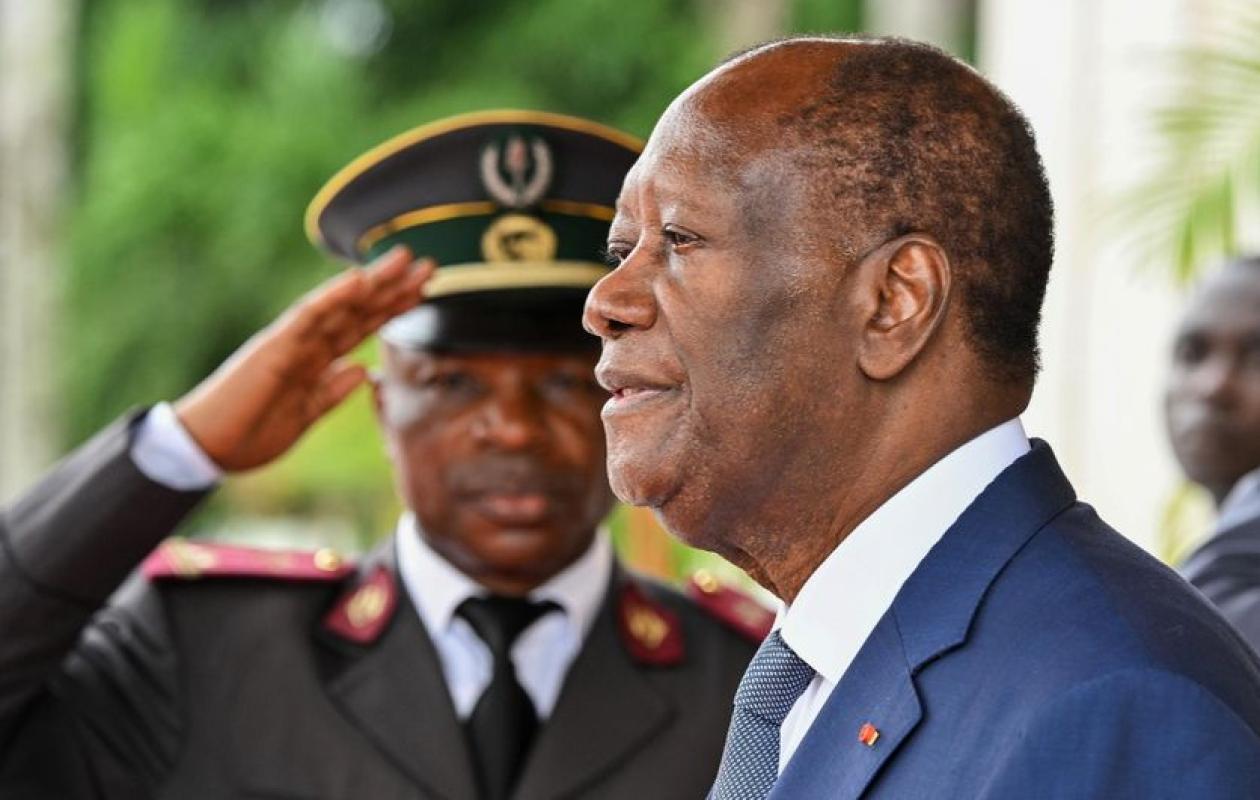
Alassane Ouattara, l'économiste devenu maître du jeu politique en Côte d'Ivoire
Economist, opposition figure, then president: Alassane Ouattara, 83, is the big favorite in Saturday's presidential election for a fourth term at the head of Côte d'Ivoire, which he has governed since 2011, at the risk of being accused of seizing power by his detractors.
With the courts having dismissed the two main opposition leaders, former President Laurent Gbagbo and Tidjane Thiam, Alassane Ouattara is aiming for victory in the first round.
He kept his candidacy in suspense for a long time before launching himself into battle at the end of July "out of duty", assuring that his "health allows it".
To prove this, he has been conducting a field campaign in recent days, with meetings and encounters in Daloa (center-west), Bondoukou (east), Yamoussoukro (center) and Abidjan, where he appeared in good shape.
In his speeches, often concise, he promises to "do more," while highlighting his record at the head of a Côte d'Ivoire with transformed infrastructure.
The undisputed leader of the majority, his supporters call him a "natural" candidate, while the opposition accuses him of "authoritarian excesses" and of choosing his opponents. In recent days, nearly 700 people have been arrested during opposition demonstrations denouncing the exclusion of candidates, according to the government.
Alassane Dramane Ouattara (ADO) has long been tied to power. After a long career at the International Monetary Fund (IMF) and the Central Bank of West African States (BCEAO), he was appointed Prime Minister in 1990 by the "father" of the Ivorian nation, Félix Houphouët-Boigny (1960-1993).
Born in Dimbokro in 1942, in the center of Ivory Coast, this Malinke Muslim (northern ethnic group) married to a French Christian woman completed most of his schooling in neighboring Burkina Faso and was long referred to as a Burkinabè.
When Houphouët-Boigny died in 1993, his Ivorian nationality was questioned by proponents of the xenophobic ideology of "Ivorianness".
In 2000, his presidential candidacy was rejected for "dubious nationality", and two years later, Côte d'Ivoire plunged into a deep political crisis that divided the country in two for almost a decade.
Mr. Ouattara's supporters support a rebellion and control the North against the power of President Laurent Gbagbo (2000-2011) who holds the South.
The crisis reached its peak during the 2010 presidential election: this time Mr. Ouattara was able to participate and won. The victory was contested by Mr. Gbagbo and Côte d'Ivoire descended into months of violence, which left more than 3,000 dead.
Supported by France, the Ouattara camp finally won and Laurent Gbagbo was arrested.
Having become president, this Francophile liberal, endorsed by the international community, managed to attract investors who quickly returned to Ivory Coast, where much needed to be rebuilt.
While his record as a builder is an undeniable strength, inequalities remain significant, as does corruption, and his detractors accuse him of uncontrolled debt (around 60% of GDP), as well as serious shortcomings in education and public health.
During his third term, Alassane Ouattara also saw the security situation in the Sahel deteriorate.
Ivory Coast must now contend with neighbors ruled by hostile military juntas—particularly Burkina Faso—whose territories are infested with jihadists. It is a threat it has so far managed to contain.
"Africa has very few leaders like Ouattara. He has experience, calmness, and knowledge of the world; he is an essential interlocutor in the region," assures a close friend of the president.
On the reconciliation front, few supporters of the Ouattara camp have been tried for crimes during the 2010-2011 crisis, but after his final acquittal by international justice, Laurent Gbagbo was able to return to Côte d'Ivoire in 2021 and was pardoned.
In the political game, technocrat Ouattara has become the one who dictates the tempo, but he will not go so far as to pardon his old rival, thus leaving him out of the running for the 2025 presidential election.
"If we don't give others the ability to fight for power, it's no longer democracy," Laurent Gbagbo says.
Re-elected in 2015 with 83% and in 2020 with more than 94% of the vote, after a contested revision of the Constitution, Alassane Ouattara is heading towards a new landslide score.
In 2020, he had said he wanted to hand over the reins. But the death of his successor, Amadou Gon Coulibaly, prompted him to re-enlist for an election that would be marked by violence that left 85 people dead.
Since then, Alassane Ouattara has often repeated that he has "half a dozen potential successors." They will have to wait a few more years.
Commentaires (6)
les pays méritent mieux
la CI mérite mieux
Participer à la Discussion
Règles de la communauté :
💡 Astuce : Utilisez des emojis depuis votre téléphone ou le module emoji ci-dessous. Cliquez sur GIF pour ajouter un GIF animé. Collez un lien X/Twitter ou TikTok pour l'afficher automatiquement.